In this post, you will learn how to improve sleep in the elderly. Many older people suffer from insomnia and unrefreshing sleep when there is no real need to.
As you age, you might notice that as you get older your sleep quality starts to decline. You might have trouble falling or staying asleep. Even if never had trouble with sleep when you were younger.
Sleep problems and insomnia are extremely common in older people. And they can have a really negative impact on the quality of your life.
Lack of quality sleep in long term will lead not only to day time fatigue and drowsiness. But it can also cause to several serious negative metabolic and hormonal effects, that can affect your health and longevity substantially.
So it’s important to take this stuff seriously and do your best to improve your sleep while you have the time.
Lack Of Quality Sleep Is Unhealthy
The obvious effects sleep deprivation has are tiredness, crankiness and things like headaches and trouble focusing.
Even short-term lack of sleep has been shown to decrease your insulin sensitivity and negatively affect your blood sugar balance.
If this goes on long-term, it can increase your risk of developing Type 2 Diabetes.
More serious cognitive effects are memory lapses and loss, impaired moral judgment, and even hallucinations. These effects can be more severe in older adults due to reduced overall energy and ability to recover from stress.
Sleep deprivation can also lower your immune system, making you more susceptible to illness. It also affects your cardiovascular system by increasing heart rate variability and increasing the risk of heart disease.
The effects on muscles and motor function include increased reaction time, decreased accuracy, aches, and even tremors. This combined with the reduced cognitive ability is why it’s extremely dangerous to drive a car when you are suffering from significant sleep deprivation. Significant can mean a single missed night or several days or weeks with a reduced amount or quality of nightly sleep.
As you can see the negative effects are so serious that there is no excuse to let impaired sleep unattended. Let’s look at what are common causes of insomnia in the elderly.
Insomnia Is Common
Insomnia is a very common problem in the elderly. So common actually that it’s often thought to be a normal part of aging even though it likely isn’t. There are plenty of seniors that sleep soundly. There is some evidence that our sleep doesn’t really change after middle age if otherwise healthy.
Insomnia means both insufficient or non-restorative sleep despite adequate time to sleep. With this definition in mind, actually over 50% of elderly people suffer from insomnia. Despite this fact insomnia is often under-treated and when it is, it’s done with drugs, i.e. sleeping pills.
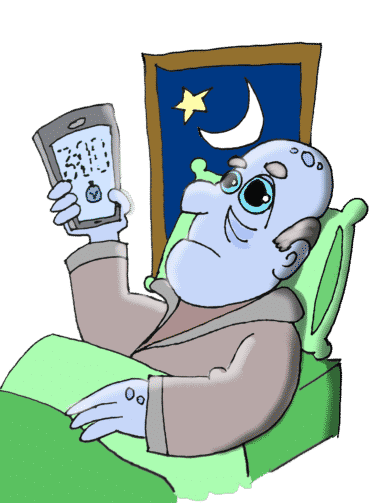
Unfortunately most drugs used to treat insomnia have substantial negative side effects. And it’s very easy to get addicted to them. Sleeping pill addiction can be severe and it’s especially common with the elderly along with pain medication addictions.
Common sleeping pill side effects include impaired memory, changes in appetite, weight changes, headaches, gastric discomfort, weakness, and headaches. It’s obvious you should try your best to improve your insomnia without drugs.
They can be used in the short term to break a vicious cycle of insomnia which causes stress towards sleep. But make sure to plan this with your doctor so you don’t get addicted.
What Causes Insomnia In The Elderly?
So if insomnia is not caused by normal aging, what is the reason? There is rarely a single cause but it’s a combination of lifestyle factors and potential medical and psychiatric illnesses.
Common medical and psychiatric causes include anxiety disorders, chronic pain, dementia, depression, GERD, menopause, nocturia (need to wake up to urinate, prostatitis/diabetes can cause this), sleep apnea, restless leg syndrome and other sleeping disorders.
Sleep Disorders
If you suspect you have some form of sleeping disorder like restless leg disorder or sleep apnea, it’s important to talk to your physician and get a sleep study.
Restless leg syndrome cause you to have uncomfortable feelings of tingling, pressure or pain on your legs as you are trying to fall as sleep, making it impossible to relax.
Here’s a great informational video about common disorders by University of California Television (UCTV) (YouTube embed. Content not owned created or owned by ElderStrength.com):
Common sleep apnea symptoms include loud snoring with pauses in breathing and waking up sweating and gasping for air. You might not have either of these symptoms so it’s important to get a sleep study done if you are not suffering from insomnia but wake up fatigued every morning.
Medications That Affect Sleep
If you have ruled out medical and psychiatric reasons for insomnia, there might be medications and substances that affect your sleep. Many common medications, alcohol, nicotine, and caffeine affect sleep negatively.
Medications like beta-blockers, diuretics, sedatives, antidepressants, steroids, and stimulants can cause insomnia and lower sleep quality.
Stress
Also, psycho social reasons like financial stress, marital difficulties, personal conflicts, bereavement and other forms of stress can cause insomnia. These psycho social reasons are actually a very common reason for insomnia in the elderly along with poor sleep hygiene.
That’s why it’s important to do your best to find solutions for the problems in your life that bother you, so you don’t have to worry about them at night.
It’s wise to talk to a therapist or a medical professional if you are having so many issues dealing with these problems that they keep you up at night.
The one thing you can improve instantly is your sleep hygiene and this can fix insomnia for many people. We will talk more about tips to improve your sleep hygiene in a moment.
Excessive sleep in elderly
If you don’t suffer from insomnia and are actually sleeping excessively and still feeling tired, it’s very important you contact your physician as soon as possible. Excessive sleeping can be a sign of severe illness and should not be treated lightly.
This is especially true if you have other symptoms like chronic pain, bleeding, fatigue, impaired cognitive function or poor memory.
So if you are someone that has suddenly begun sleeping much more than usual and looking for tips to improve sleep, the first step is to contact your doctor.
If you just feel like you are not getting enough sleep during the night, or the sleep you are having is not refreshing, but not excessive, the tips I’m about to show you can help you improve your sleep.
How To Improve Sleep In The Elderly: 7 Tips
These seven simple tips can drastically help you improve sleep. Don’t worry, most of them are very affordable. You can also include most of them today in your routine!
1. Exercise
Besides all the other positive effects, exercise has been proven to improve sleep quality. Both strength training and cardiovascular exercise has been shown to alleviate insomnia.
Exercise can help with weight loss which can directly affect sleep apnea by reducing pauses in breathing and thus reducing the negative effects of sleep apnea.
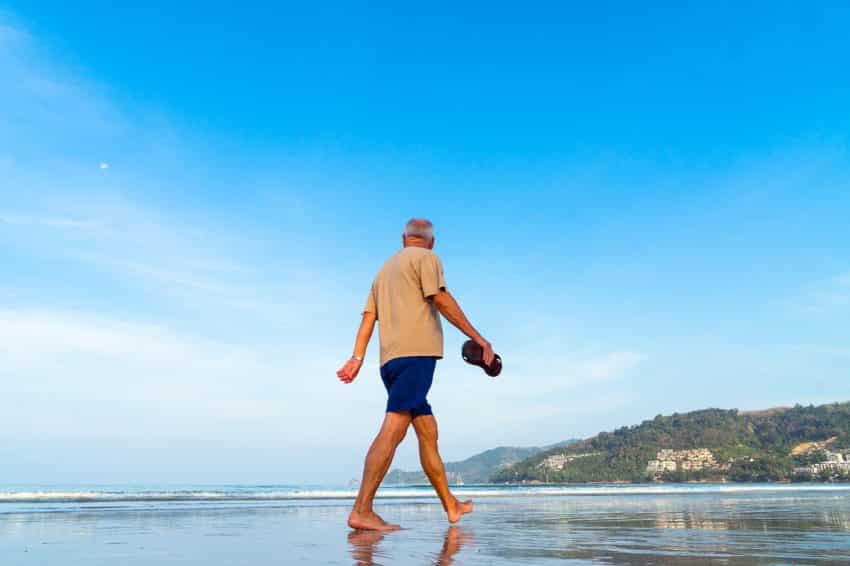
Exercising too much or too close to going bed can affect your sleep quality negatively however. This is because exercise raises your heart rate for several hours and stimulates your central nervous system. If you exercise right before bed, you are not giving your body time to wind down and relax. Which is essential for sleep.
This is why you should include exercise in your everyday routine. The best combination for most seniors is to do low-intensity cardio like walking daily and combine it with strength training a few times per week.
2. Eat before bed
Hypoglycemia or low blood sugar can cause insomnia. It can prevent you from falling asleep but it’s more common to wake up around 3 pm feeling sweaty, hungry full of energy.
This is because low blood sugar will cause a surge of adrenalin and cortisol that wakes you up. It’s a natural signal from our bodies to start looking for food instead of resting.
Sleeping with a full stomach keeps your blood sugar steady through the night and prevents the premature stress hormone spike that wakes you at night.
Eating a substantial meal that contains plenty of slow-digesting carbohydrates, protein, and some fat before bed will keep your body satiated during the night.

Don’t overboard with the eating. Eating too much will likely lower the quality of your sleep. Think of that Thanksgiving meal that was just too large and caused you to roll in discomfort having nightmares all night.
So have a reasonable sized meal an hour or two before bed to keep your blood sugar levels steady through out the night.
Don’t worry about weight gain either if you have heard myths that say that eating at night makes you fat. Meal timing is pretty much an insignificant factor in weight gain.
What matters more is what you eat and how much you eat it. Eating at a certain time of the day won’t make you gain weight unless it’s added as an extra meal to your regular meal routine.
3. Drop the temperature
The temperature of our bedroom can affect our sleep quality. Many people think sleeping in a warm and cosy bedroom would be better but it’s actually the other way around.
Setting the thermostat to around 17 to 20 degrees Celsius (60 to 67 Fahrenheit) is what you should aim for in the bedroom. This is because a colder temperature will make you fall a sleep easier and have deeper sleep.
Our bodies regulate our circadian rhythm partly by body temperature. When we feel sleepy or are asleep our body temperature goes down. This works the other way around as well. If we lower our body temperature slightly, we tend to get tired and sleepy, especially if we are under a comfortable warm blanket. On the other hand, if we feel too hot it can prevent us from falling asleep.
If you live in a warm climate you probably need an AC to achieve a temperature that’s low enough. If you don’t have an AC and it’s regularly too hot to sleep. You can use fans and moist sheets to bring down your body temperature. The fans make the water evaporate from the wet sheet and this will cool the sheets down.
4. Improve ventilation in your bedroom
One thing many people aren’t aware of is that your bedroom needs to be well ventilated. When we breathe we produce carbon dioxide. This really isn’t a problem in open spaces and in the outdoors because the levels will stay constant.
When we are inside this changes, however. If you live in an older house without assisted ventilation, it’s possible the levels of carbon dioxide will increase during the night enough to disturb sleep.
This is especially true if you have a small bedroom with two adults sleeping in it and the door is closed. If the ventilation is not designed right the CO2 levels can rise to unhealthy levels.
Carbon dioxide levels are normally around 400-500 ppm outside. Good levels for indoors and homes are around 600 ppm. At around 1000 – 2000 ppm you can get mild negative health effects like general drowsiness and serious adverse health effects begin around 2500 ppm.
You can measure your bedroom carbon dioxide levels with a CO2 meter (affiliate link, I earn a small commission that helps to run the site if you buy through it. No cost to you.).

Studies have shown that high carbon dioxide levels during the night will affect your sleep quality negatively. Making your cognitive performance and alertness lower.
This is why it’s very important to make sure the ventilation of your home and especially the bedroom is sufficient. You should consult a construction or environmental health specialist for this kind of evaluation.
A simple way to make sure the carbon dioxide levels won’t rise too high is to leave a window open during the night. If you live in a cold or noisy neighborhood, at least air out the room well before bed. Also, leave the bedroom door open, this allows the carbon dioxide to dilute to a much larger volume of air.
5. Stretch and relax
To be able to fall asleep and also stay asleep, your body needs to relax. If you have built-up muscle tension and sore muscles or pain, your body can’t really relax.
The easiest way to get your body to relax is to due to some easy stretching at night. Stretching a muscle will release any tension and allows the muscle to relax. Stretching has been shown to lower stress hormone levels which will also have positive effects on your mind.
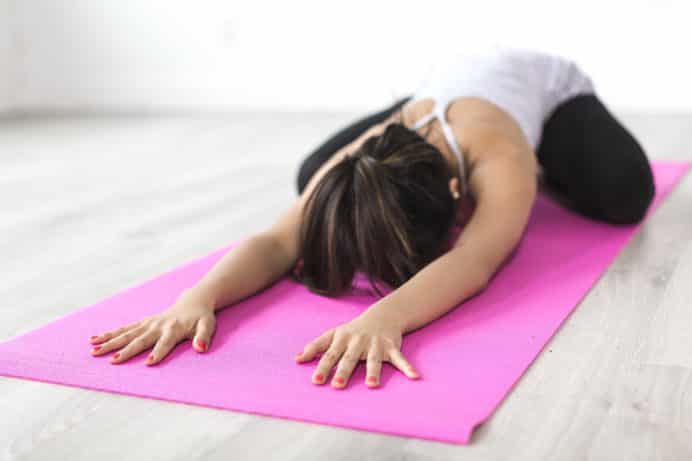
You should do long static stretches and move in a restful manner so your heart rate doesn’t rise. Stretch at least all the large muscle groups of the legs and the upper body. You can find stretching instructions in the articles Hamstring Stretches For Seniors [Quick Guide], Best Stretches For Seniors and The Elderly [Two Tips], 4 Simple Hip Stretches For Seniors and Stretching Exercises For The Elderly [With Examples].
Foam rolling is also a great option for stretching and helps you relax at night. You can learn more about foam rolling in the article Foam Roller Exercises For Seniors [Simple Guide].
Once you have stretched you can take a minute to breathe deep and do some relaxation exercises. By doing this routine nightly your body will learn to relax before bed.
6. Dim your bedroom
Making your bedroom dark is one of the most important things to do for sleep hygiene. These days you are bombarded with artificial light everywhere. Your TV, smartphone, and those little indicator LEDs on almost every single charger and appliance can affect your sleep quality negatively.
Optimally we would want our sleeping environment to be completely dark. This is because light controls our sleep. In nature, creatures are awake when there’s light and sleep in the dark. Well except for the nocturnal creatures of course. But you’re not one.
This can be hard to achieve in your bedroom without taking specific precautions. If you don’t have effective blinds in your bedroom windows you should get a blinding curtain (affiliate link) that keeps all the light out. Even if you live in a place where the nights are actually dark, artificial light from street lights and billboards can illuminate your bedroom.
You should also get rid of any electrical devices with lights in your bedroom. This includes smartphones, internet routers, and televisions.
You should also reduce the amount of light, especially blue light you get a few hours before going to bed. This means no sitting in front of the laptop or the television right before bed. Or getting blue light filtering glasses or apps.
7. Silence your bedroom
This last one is kind of obvious but many people seem to be unaware of how much noise can disturb our sleep. Even if you don’t think you are easily disturbed by sounds, it’s likely they will wake you up from deep sleep.
The more silent you can make your bedroom, the better. This can be hard because there are things like noisy neighbors, traffic, airplanes, and city noises.
But you should do your best to remove any noisy appliances, clocks, etc. from your bedroom. If you sleep with a window open, you are naturally subjected to more noise from the outdoors.
If you live in a noisy neighborhood, you could consider trying some earplugs. It might take some trying different models and getting used to them, but once you can use them comfortably they will reduce ambient noise significantly.

The science is clear that noise during the night will degrade your sleep, especially if you are sensitive. So, it’s very important you do your best to reduce any noise during the night.
Conclusion
I hope you found these tips for improving insomnia and sleep in the elderly useful and will try them. If you find they work for you, I would love to hear from you! If you have any questions, please leave a comment below and I will get back to you.
Sleep is paramount for health and life quality. So you should do your best to allow your mind and body to rest during the night. If the tips I showed here don’t offer relief, it’s always wise to talk to your doctor.
There are short-term medications and supplements that can help alleviate insomnia and improve your sleep quality. If you are suffering from serious insomnia, there is no shame in using them. But they should be the last line of defense so to speak.
If you enjoy reading about strength training and health tips for the elderly please bookmark this site and subscribe to our newsletter.
See you next time and thanks for reading!
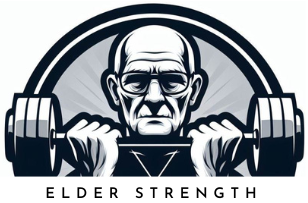
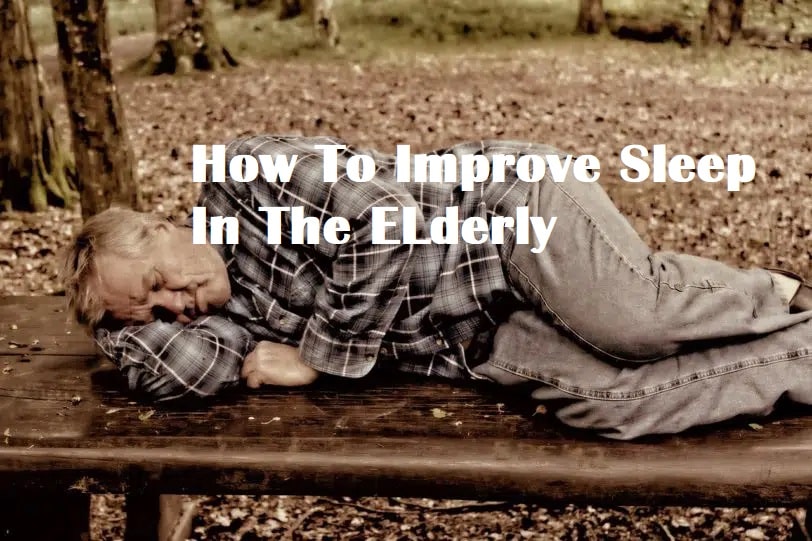
I’ve always said nothing helps sleep like exercise and a cool bedroom. I remember those warmer summer nights in an old apartment of mine and I’d literally be sleeping fewer than three hours a night. I’m also a huge fan of reading before bed, too, but from a hardcopy book, since it’s far easier on the eyes. My own insomnia has lowered substantially since I developed such a system.
I never thought of dimming the lights, though, so I’ll definitely be adding this to my repertoire. Thanks for the awesome tips.
Thanks for the comment Todd! Exercise and cool bedroom will both definitely improve your sleep hygiene and sleep quality. Probably everyone of us has slept in too hot environment and it’s truly frustrating to just lay there and sweat in your sheets. Your tip about reading a real book is actually a very good one. It allows your mind to relax without watching an blue light emitting screen. Dimming your bedroom and all the lights in is definitely advisable.